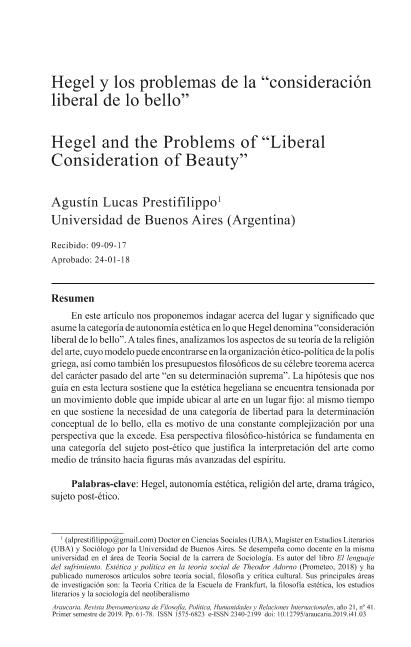Mostrar el registro sencillo del ítem
dc.contributor.author
Prestifilippo, Agustín Lucas

dc.date.available
2019-05-13T20:34:58Z
dc.date.issued
2017-06
dc.identifier.citation
Prestifilippo, Agustín Lucas; Hegel y los problemas de la “consideración liberal de lo bello”; Universidad de Sevilla; Araucaria; 41; 6-2017; 61-78
dc.identifier.issn
1575-6823
dc.identifier.uri
http://hdl.handle.net/11336/76202
dc.description.abstract
En este artículo nos proponemos indagar acerca del lugar y significado que asume la categoría de autonomía estética en lo que Hegel denomina “consideración liberal de lo bello”. A tales fines, analizamos los aspectos de su teoría de la religión del arte, cuyo modelo puede encontrarse en la organización ético-política de la polis griega, así como también los presupuestos filosóficos de su célebre teorema acerca del carácter pasado del arte “en su determinación suprema”. La hipótesis que nos guía en esta lectura sostiene que la estética hegeliana se encuentra tensionada por un movimiento doble que impide ubicar al arte en un lugar fijo: al mismo tiempo en que sostiene la necesidad de una categoría de libertad para la determinación conceptual de lo bello, ella es motivo de una constante complejización por una perspectiva que la excede. Esa perspectiva filosófico-histórica se fundamenta en una categoría del sujeto post-ético que justifica la interpretación del arte como medio de tránsito hacia figuras más avanzadas del espíritu.
dc.description.abstract
In this paper we propose to analyze the place and meaning of the concept of aesthetic autonomy in what Hegel calls a “liberal consideration of beauty”. In order to do that, we study the dimensions of his theory of religion in the form of art, whose model can be found in the ethical-political organization of the Greek polis, as well as in the philosophical assumption of his famous theorem on art`s past character in “its supreme determination”. Our hypothesis is that Hegel`s aesthetics is being strained by a double movement that prevents us from locating art in a fixed place: at the same time that he holds the necessity of a category of freedom for a conceptual determination of beauty, it is the object of a constant complexity by a perspective which exceeds it. This philosophicalhistorical perspective is founded on the category of a post ethical subject which justifies the interpretation of art as a means of transition to more advanced figures of the spirit.
dc.format
application/pdf
dc.language.iso
spa
dc.publisher
Universidad de Sevilla
dc.rights
info:eu-repo/semantics/openAccess
dc.rights.uri
https://creativecommons.org/licenses/by-nc-sa/2.5/ar/
dc.subject
Hegel
dc.subject
Autonomía Estética
dc.subject
Sujeto Post-Ético
dc.subject
Religión del Arte
dc.subject
Teoría Social
dc.subject.classification
Ciencia Política

dc.subject.classification
Ciencia Política

dc.subject.classification
CIENCIAS SOCIALES

dc.subject.classification
Otras Humanidades

dc.subject.classification
Otras Humanidades

dc.subject.classification
HUMANIDADES

dc.title
Hegel y los problemas de la “consideración liberal de lo bello”
dc.title
Hegel and the Problems of “Liberal Consideration of Beauty”
dc.type
info:eu-repo/semantics/article
dc.type
info:ar-repo/semantics/artículo
dc.type
info:eu-repo/semantics/publishedVersion
dc.date.updated
2019-05-13T18:31:28Z
dc.identifier.eissn
2340-2199
dc.journal.number
41
dc.journal.pagination
61-78
dc.journal.pais
España

dc.journal.ciudad
Sevilla
dc.description.fil
Fil: Prestifilippo, Agustín Lucas. Consejo Nacional de Investigaciones Científicas y Técnicas; Argentina. Universidad de Buenos Aires. Facultad de Ciencias Sociales. Instituto de Investigaciones "Gino Germani"; Argentina
dc.journal.title
Araucaria
dc.relation.alternativeid
info:eu-repo/semantics/altIdentifier/url/https://revistascientificas.us.es/index.php/araucaria/article/view/3871
dc.relation.alternativeid
info:eu-repo/semantics/altIdentifier/doi/https://dx.doi.org/10.12795/araucaria.2019.i41.03
Archivos asociados
